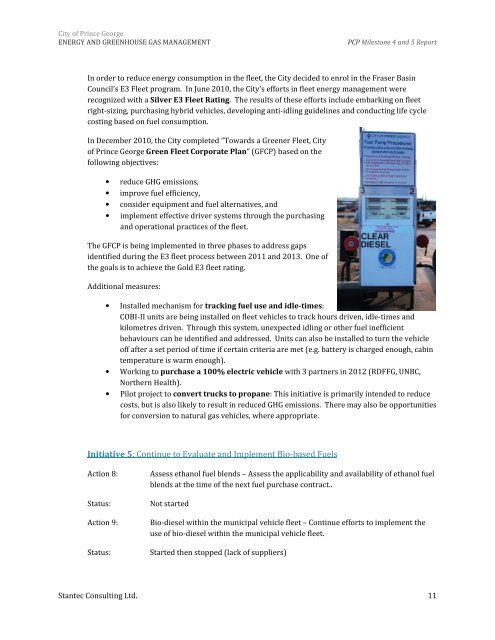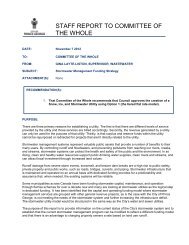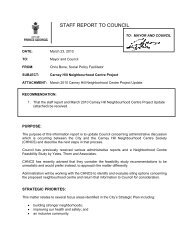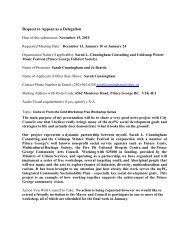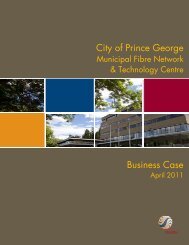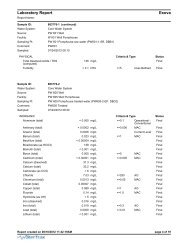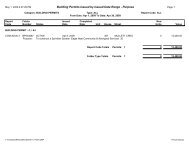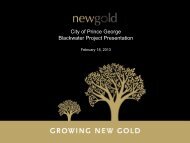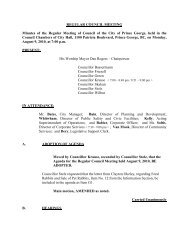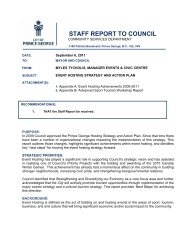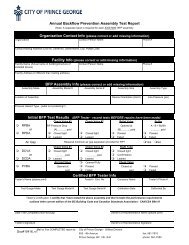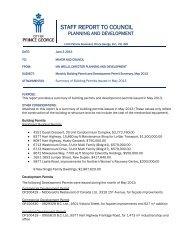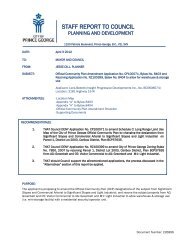Corporate and Community Update for Greenhouse Gas Emissions ...
Corporate and Community Update for Greenhouse Gas Emissions ...
Corporate and Community Update for Greenhouse Gas Emissions ...
Create successful ePaper yourself
Turn your PDF publications into a flip-book with our unique Google optimized e-Paper software.
City of Prince George<br />
ENERGY AND GREENHOUSE GAS MANAGEMENT<br />
PCP Milestone 4 <strong>and</strong> 5 Report<br />
In order to reduce energy consumption in the fleet, the City decided to enrol in the Fraser Basin<br />
Council’s E3 Fleet program. In June 2010, the City’s ef<strong>for</strong>ts in fleet energy management were<br />
recognized with a Silver E3 Fleet Rating. The results of these ef<strong>for</strong>ts include embarking on fleet<br />
right-sizing, purchasing hybrid vehicles, developing anti-idling guidelines <strong>and</strong> conducting life cycle<br />
costing based on fuel consumption.<br />
In December 2010, the City completed “Towards a Greener Fleet, City<br />
of Prince George Green Fleet <strong>Corporate</strong> Plan” (GFCP) based on the<br />
following objectives:<br />
• reduce GHG emissions,<br />
• improve fuel efficiency,<br />
• consider equipment <strong>and</strong> fuel alternatives, <strong>and</strong><br />
• implement effective driver systems through the purchasing<br />
<strong>and</strong> operational practices of the fleet.<br />
The GFCP is being implemented in three phases to address gaps<br />
identified during the E3 fleet process between 2011 <strong>and</strong> 2013. One of<br />
the goals is to achieve the Gold E3 fleet rating.<br />
Additional measures:<br />
• Installed mechanism <strong>for</strong> tracking fuel use <strong>and</strong> idle-times:<br />
COBI-II units are being installed on fleet vehicles to track hours driven, idle-times <strong>and</strong><br />
kilometres driven. Through this system, unexpected idling or other fuel inefficient<br />
behaviours can be identified <strong>and</strong> addressed. Units can also be installed to turn the vehicle<br />
off after a set period of time if certain criteria are met (e.g. battery is charged enough, cabin<br />
temperature is warm enough).<br />
• Working to purchase a 100% electric vehicle with 3 partners in 2012 (RDFFG, UNBC,<br />
Northern Health).<br />
• Pilot project to convert trucks to propane: This initiative is primarily intended to reduce<br />
costs, but is also likely to result in reduced GHG emissions. There may also be opportunities<br />
<strong>for</strong> conversion to natural gas vehicles, where appropriate.<br />
Initiative 5: Continue to Evaluate <strong>and</strong> Implement Bio-based Fuels<br />
Action 8:<br />
Status:<br />
Action 9:<br />
Status:<br />
Assess ethanol fuel blends – Assess the applicability <strong>and</strong> availability of ethanol fuel<br />
blends at the time of the next fuel purchase contract..<br />
Not started<br />
Bio-diesel within the municipal vehicle fleet – Continue ef<strong>for</strong>ts to implement the<br />
use of bio-diesel within the municipal vehicle fleet.<br />
Started then stopped (lack of suppliers)<br />
Stantec Consulting Ltd. 11


